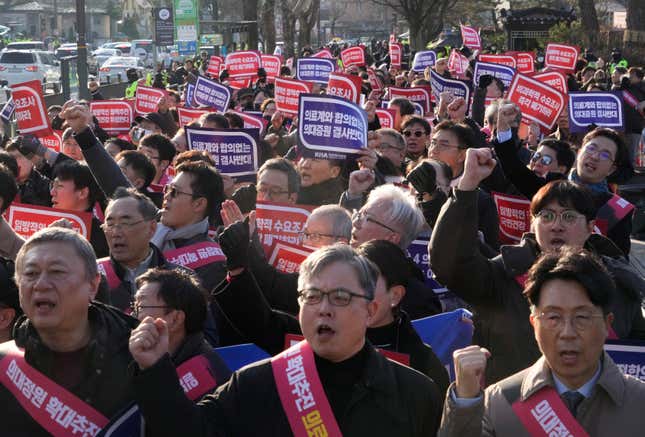
South Korea’s government has given striking young doctors four days to return to work or face indictment and suspension of their medical licenses.
The ultimatum was issued on Monday, as approximately 9,000 medical interns and residents went on strike to protest a government plan to increase medical school admissions by about 65 percent.
The work stoppages, which began last week, have had a significant impact on their hospitals’ operations, with numerous surgeries and other treatments being cancelled.
According to Safety Minister Lee Sang-min, hospitals are in chaos and emergency services are in a “dangerous situation” as a result of the strike.

“Considering the gravity of the situation, the government issues the last plea,” he said in a statement.
“If you return to the hospital you left behind by February 29, you won’t be held responsible for what has already happened,” he went on to say. “We urge you to remember your voice will be heard loudly and most effectively when you are by the side of patients.”
Government officials say that more doctors are needed to deal with South Korea’s rapidly ageing population. The country currently has one of the lowest doctor-to-patient ratios in the developed world.
The young protesting doctors argue that the government should first address pay and working conditions before attempting to increase the number of physicians.
Vice Health Minister Park Min-soo stated that those who do not return to work by the end of February will face at least a three-month suspension of their medical licenses.
He stated that they may face additional legal action, such as investigations and possible indictments.
Under South Korea’s medical law, the government has the authority to issue back-to-work orders to doctors and other medical personnel if it believes there are serious risks to public health.
Refusing to comply with such an order could result in up to three years in prison or 30 million won ($22,480) in fines, as well as the revocation of medical licenses.
There are approximately 13,000 medical interns and residents in South Korea, with the majority working and training at 100 hospitals. They typically assist senior doctors during surgeries and care for inpatients.
They account for 30 to 40 percent of all doctors at some leading hospitals.
The Korea Medical Association, which represents approximately 140,000 doctors in South Korea, has expressed its support for the striking doctors but has not decided whether to join the trainee doctors’ walkouts.
Senior doctors have held a series of rallies to oppose the government’s plan.
Earlier this month, the government announced that universities would admit 2,000 more medical students next year, up from the current 3,058. The government intends to add up to 10,000 doctors by 2035.
According to a public survey, approximately 80% of South Koreans support the government’s plan.
Critics suspect that doctors, who are among the highest-paid professionals in South Korea, are opposed to the recruitment plan because they fear increased competition and lower wages.
Striking doctors have expressed concern that increased competition will lead to overtreatment, raising public medical costs.
Leave a Reply